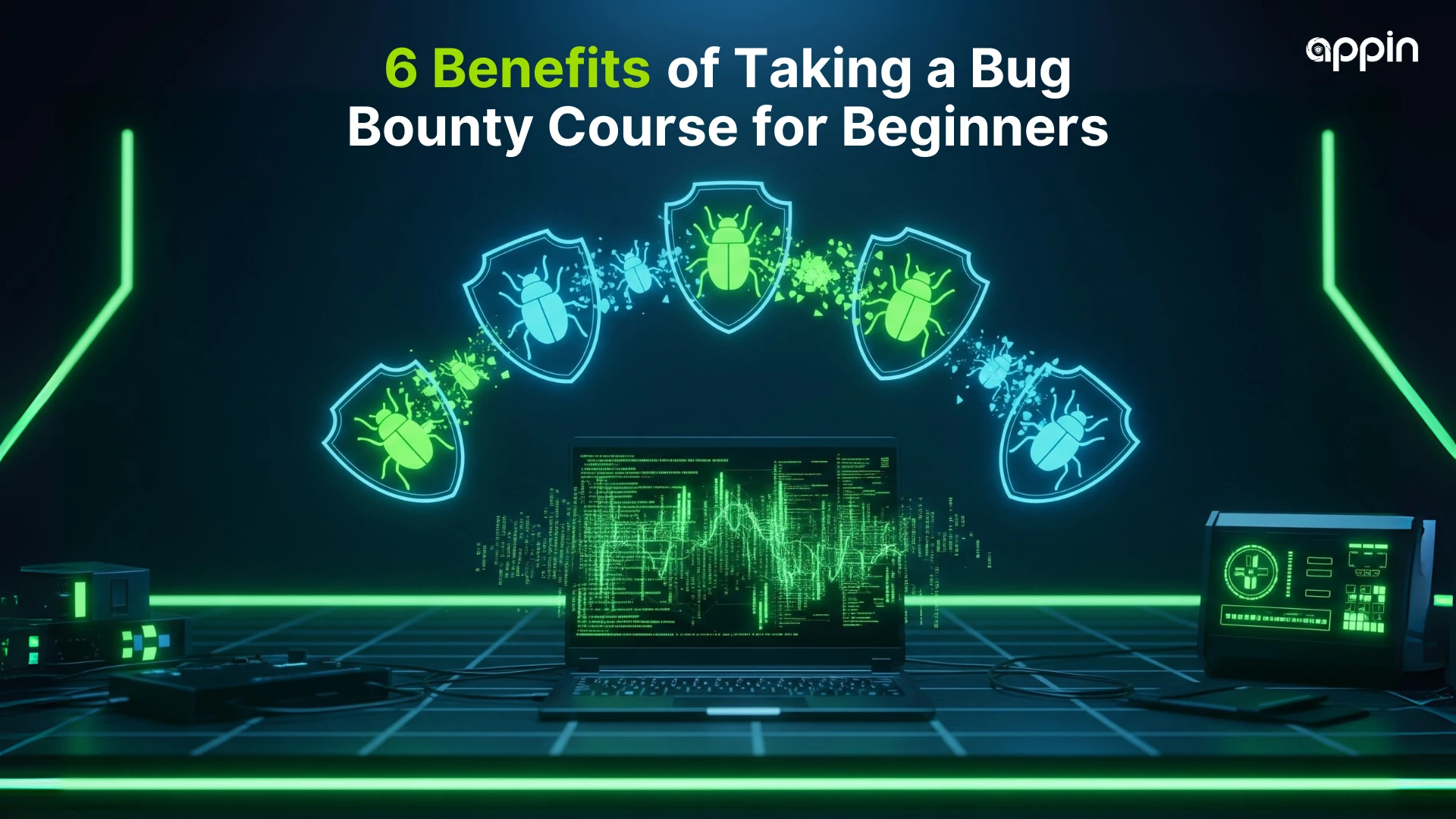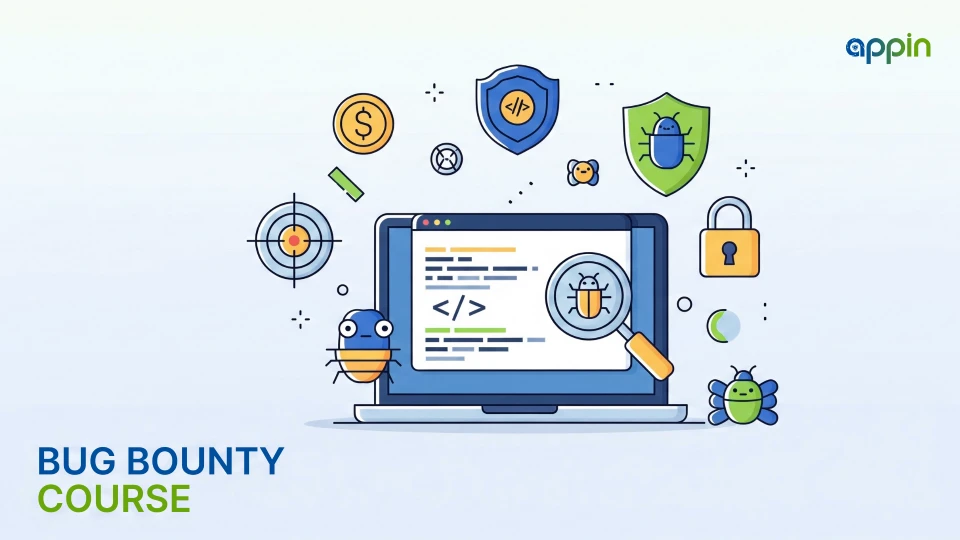Why is a bug bounty course a great start for your hacking career?
A bug bounty course is a great way to start your hacking career because it provides structured learning, hands-on practice, and recognition for your skills. For students and beginners, this path combines learning with real opportunities to grow.
Bug bounty programs reward ethical hackers who identify and report security flaws. While many students try to learn through scattered tutorials, a formal course builds a solid foundation much faster. It guides you step by step, from basic security concepts to advanced testing methods. This makes it an excellent choice for a hacking career for beginners.
The real benefit of such training is that it bridges theory with practice. You do not just study cybersecurity, you apply it in real cases through labs and challenges.
In this blog, we will cover six ways a bug bounty course helps you build skills, earn recognition, and kickstart your career in ethical hacking.
What is a bug bounty course?
A bug bounty course trains you to find and report vulnerabilities legally while gaining structured knowledge about security testing.
When students ask “what is bug bounty course?”, the answer is simple: it is a program designed to teach ethical hacking through practical challenges. Instead of guessing and using random tools, you learn in a step-by-step way that builds real skills.
Key features of bug bounty training in India often include:
- Fundamentals of security testing like web applications, networks, and APIs.
- Hands-on practice labs to safely test vulnerabilities.
- Guidelines on responsible disclosure so you can report bugs the right way.
- Participation in real bug bounty platforms such as HackerOne or Bugcrowd.
Unlike trial and error, a course saves time by guiding you through tested methods and best practices. This is especially important for beginners who may waste months without learning how real bug hunters work.
Appin offers a Bug Bounty Diploma that helps students practice in safe environments and understand industry standards. Such training ensures that you not only learn tools but also develop the mindset of an ethical hacker.
In short, a bug bounty course turns curiosity into structured learning, preparing you for both bug hunting and a broader career in cybersecurity.
How does a bug bounty course teach practical hacking skills?
A bug bounty course teaches practical hacking skills by using real world labs, capture-the-flag challenges, and hands-on projects that simulate real attacks.
Instead of focusing only on theory, these programs are designed to make students practice actively. You learn how vulnerabilities actually appear and how to exploit them safely. This develops practical hacking skills that are useful in bug bounty hunting as well as professional jobs.
Ways a real world bug bounty training builds your skills:
- Practice labs: Simulated websites and systems where you can test for SQL injection, cross-site scripting, and other flaws.
- Capture-the-flag challenges: Fun, competitive tasks where you solve hacking puzzles.
- Guided tools training: Learning how to use Burp Suite, Nmap, and other core security tools effectively.
- Project-based learning: Reporting vulnerabilities in structured formats just like professionals do.
This mix of theory and practice ensures that you gain confidence with both techniques and tools. By completing projects, you also create a portfolio that demonstrates your abilities.
For those serious about building strong technical skills, training such as Certified Ethical Hacking goes hand in hand with bug bounty learning, offering broader exposure.
A good course not only teaches you how to hack but also why security matters. This helps you think like both an attacker and a defender, a mindset essential for every ethical hacker.
Can a bug bounty course help you earn while learning?
Yes, a bug bounty course can help you earn while learning because many programs pay rewards for valid vulnerability reports.
Bug bounty platforms like HackerOne, Bugcrowd, and Synack allow beginners to test their skills on real systems. If you find a flaw and report it correctly, the company rewards you financially. This means you can earn money with bug bounty even as a student.
Examples of bug bounty rewards for students include:
- Small payouts for discovering low-level bugs such as broken authentication.
- Larger rewards for critical issues like remote code execution.
- Recognition in company “Hall of Fame” pages that boost your credibility.
The value is not only in the money but also in the learning. Every report you submit improves your technical and communication skills. Even if your first few reports are duplicates or rejected, the process teaches you how professionals work.
By combining structured training with real bug bounty platforms, you build both income and experience. While it may not replace a full-time salary at the start, it is an excellent way to grow confidence and showcase your talent in cybersecurity.
A bug bounty course makes this process easier by teaching how to identify valid targets, test safely, and write professional reports that increase your chances of success.
How does it improve your resume and career prospects?
A bug bounty course improves your resume and career prospects by showcasing certifications, hands-on achievements, and problem-solving experience.
Employers in cybersecurity value real proof of skills. Adding bug bounty achievements to your resume shows that you can identify and report vulnerabilities effectively. Recruiters know this requires both technical knowledge and persistence.
Ways bug bounty helps with resume and hacking career opportunities:
- Certifications: Completing training programs adds credibility to your profile.
- Portfolio of reports: Sharing anonymized bug reports demonstrates your real experience.
- Recognition: Listings in Hall of Fame pages or public acknowledgments stand out to employers.
- Soft skills: Bug hunting requires patience, research, and clear reporting, all of which employers value.
For students and early professionals, this combination is powerful. Many entry-level applicants list only coursework, but bug bounty hunters can show proven results.
Pairing your achievements with a Cyber Security Certification makes your resume even stronger. It reflects both structured knowledge and practical application. This blend is what recruiters look for when hiring junior security analysts, penetration testers, or ethical hackers.
In short, bug bounty courses do more than teach technical skills. They help you build a portfolio that tells employers you can deliver results in the real world.
Why does a bug bounty course build community and networking?
A bug bounty course builds community and networking by connecting students with peers, mentors, and professionals who share the same interests.
When you join a training program, you are not learning alone. You gain access to forums, study groups, and online platforms where you can ask questions and share discoveries. This creates a strong bug bounty community that supports your growth.
Networking opportunities in bug bounty programs include:
- Student groups and clubs where you solve labs and challenges together.
- Online forums and Discord servers where hackers exchange tips and resources.
- Capture-the-flag competitions that let you compete and learn from others.
- Mentorship opportunities from instructors or experienced bug hunters.
These connections are valuable because cybersecurity is a constantly changing field. By engaging with others, you learn faster, stay updated, and hear about career opportunities.
For beginners, being part of a community also keeps motivation high. When you see peers solving challenges, it pushes you to keep practicing.
Networking is not just about friendship, it is about building credibility. Many professionals find internships, freelance gigs, or full-time jobs through contacts made in these communities.
A good bug bounty course encourages this culture of collaboration, ensuring that students learn not just from instructors but from each other.
How does it prepare you for advanced certifications and roles?
A bug bounty course prepares you for advanced certifications and roles by giving you a strong foundation in real-world security testing.
Most higher-level certifications expect students to already know how vulnerabilities work. By practicing in bug bounty labs, you build the skills required for advanced training like penetration testing or CEH. This makes a bug bounty course an effective first step in your bug bounty career path India.
Ways bug bounty supports advanced learning:
- Hands-on experience with real vulnerabilities helps when preparing for CEH or OSCP.
- Understanding of tools like Burp Suite, Metasploit, and Nmap carries over into advanced labs.
- Reporting practice improves the communication skills needed in professional roles.
- Confidence gained from finding and fixing flaws makes you job-ready.
If you plan to move into specialized areas, bug bounty training also helps. For example, it prepares you for the C|EH v13 Ethical Hacker Course, where you learn structured penetration testing in depth.
This path is practical for students who want to progress step by step: start with bug bounty training, then move to professional certifications, and finally explore roles such as penetration tester, SOC analyst, or cybersecurity consultant.
In short, a bug bounty course does not just help you today, it prepares you for the certifications and job roles that define your long-term career in ethical hacking.
What should you remember about bug bounty courses and hacking careers?
Students should remember that a bug bounty course is one of the most practical ways to begin a career in ethical hacking because it combines structured learning with real-world application.
Throughout this blog, you have seen six clear benefits: it trains you to find vulnerabilities legally, develops practical skills, creates opportunities to earn, strengthens your resume, connects you with a community, and prepares you for advanced certifications. These are valuable bug bounty benefits that help you grow faster than self-study alone.
For beginners in India, this is a smart path because it not only teaches technical skills but also builds confidence and credibility. With every challenge solved and report submitted, you move closer to building a strong professional identity.
If you are ready to start a hacking career in India, enquire now with Appin about the Bug Bounty Diploma and take the first step toward your future in cybersecurity.




